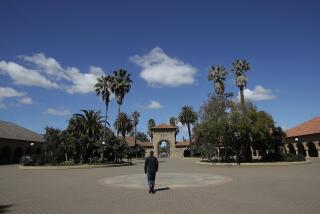College Hopefuls Feel Push to Start Early
- Share via
METUCHEN, N.J. — William Hoffman started his college search in 10th grade. By the start of his senior year last fall, he knew his first choice was Harvard. The school even sent him a letter encouraging him to apply.
So Hoffman, ranked third academically at Metuchen High School in northern New Jersey, applied early to Harvard last October and did the same with the University of Chicago, as a fallback. But months later, Hoffman still doesn’t know where he’ll go to college--illustrating just one of the problems critics find with early admission.
The practice has become a powerful draw in a market where colleges covet the best candidates and students pursue a belief that the better the diploma, the better their future.
But some critics, including Yale’s president, say it can force teenagers into premature decisions and gives unfair advantage to those with money and admissions know-how. It also stretches the wait for people like Hoffman.
Early admission was first used in the 1950s by elite colleges, but the practice spread about a decade ago. Now more than 400 colleges and universities invite high school seniors to apply ahead of the crowd, a College Board survey found.
Generally, these schools offer “early decision,” which requires those admitted to withdraw applications elsewhere, or nonbinding “early action,” offered by both Harvard and Chicago. Some offer both.
Of 1.2 million applicants for the freshman class of 2000, about 163,000 sought early admission--nearly 14%, the College Board found.
Yale President Richard Levin has called for an end to early admissions, and has floated the idea to the school’s governing board and fellow college presidents. (Last fall, 2,118 youngsters applied under Yale’s binding early decision--a 17% increase from the previous year--and 550 got in.)
“The pressure admissions has brought to America’s teenagers is pretty substantial,” Levin said. Early admission only makes it worse, he believes.
Ostensibly, early admission serves people like Hoffman, who began senior year ready to apply. But it also helps colleges secure a chunk of the freshman class and burnish their image as selective.
“My sense is that the universities and colleges that practice early admission have focused mainly on the advantages that practice brings them,” Levin said. They “haven’t listened sufficiently to parents, students, counselors and principals about the adverse effects.”
Growing rivalry for admission to places like Yale, which will enroll some 1,300 freshmen next fall, compels too many teens to pick a first choice too soon, Levin said.
For those rejected in the early round, it prolongs the preoccupation with entry to a good school, he said. Now those students must wait until March and April, the peak for regular admissions.
Levin also echoes those who say early admission favors rich families that don’t need to shop for the most affordable college, and gives an edge to kids at schools with counselors who can closely oversee applications.
Recent research seems to support another suspicion, which schools deny: applying early improves a candidate’s odds.
Two Harvard professors and a former Wesleyan University official looked at 14 selective colleges and found that among students with comparable credentials, applying early was equal to raising their SAT score about 100 points.
But defenders call early admission efficient. They say problems occur only when it’s used to fill too many slots.
Dartmouth College admissions dean Karl Furstenberg admits no more than a third of the school’s 1,050 freshman by early decision. “The concept makes sense if the college operates it responsibly and thoughtfully,” he said.
Harvard accepted 1,174 students under early action this year, potentially 71% of next fall’s 1,650 freshmen. Based on past patterns, admissions director Marlyn McGrath Lewis expects up to 20% of those accepted early to enroll elsewhere.
More to Read
Sign up for Essential California
The most important California stories and recommendations in your inbox every morning.
You may occasionally receive promotional content from the Los Angeles Times.













